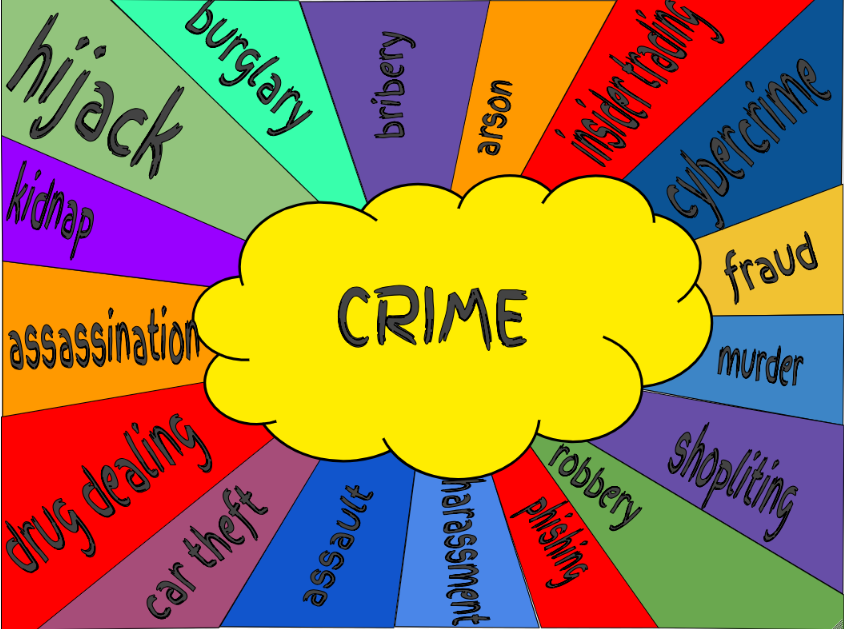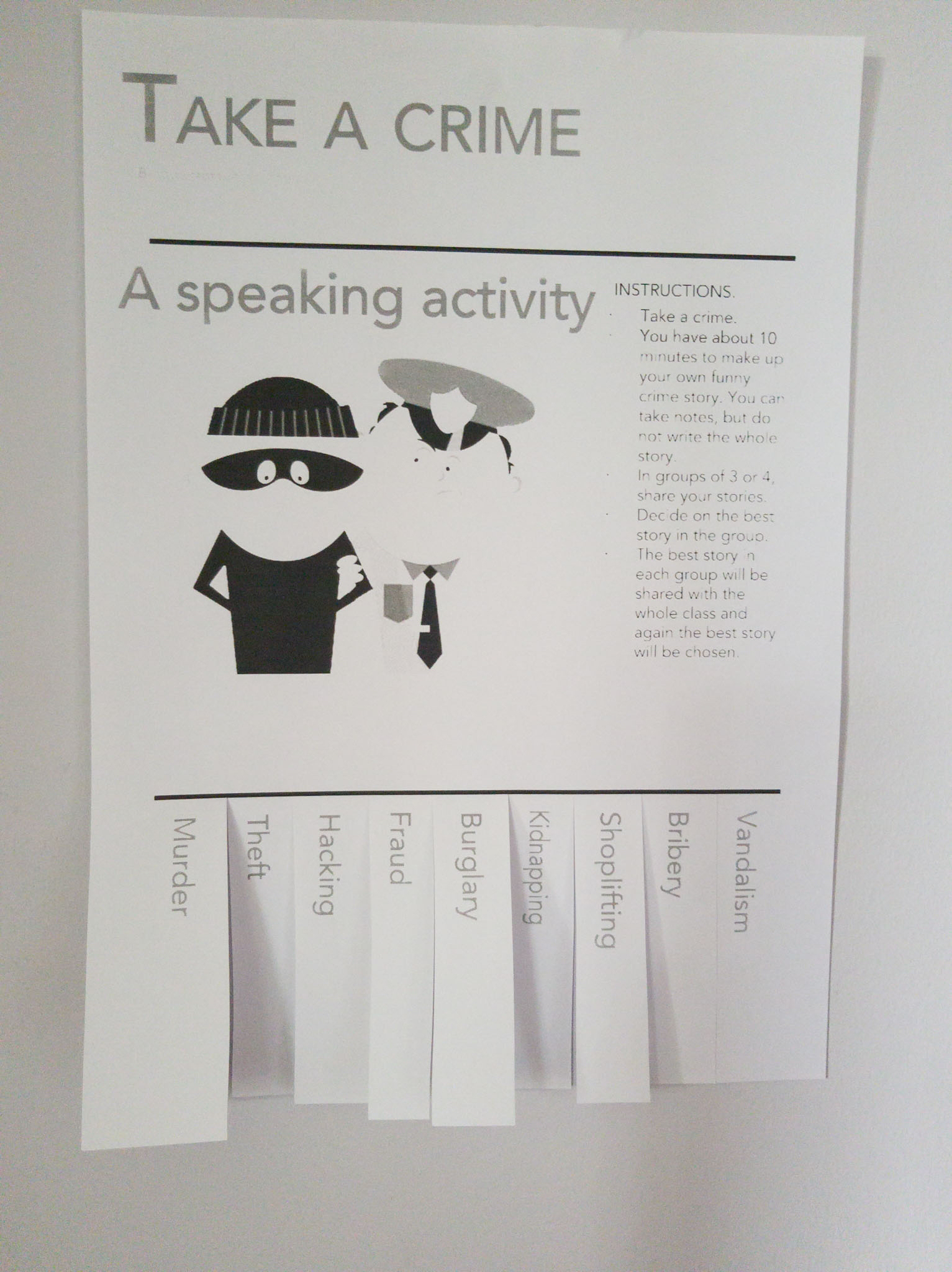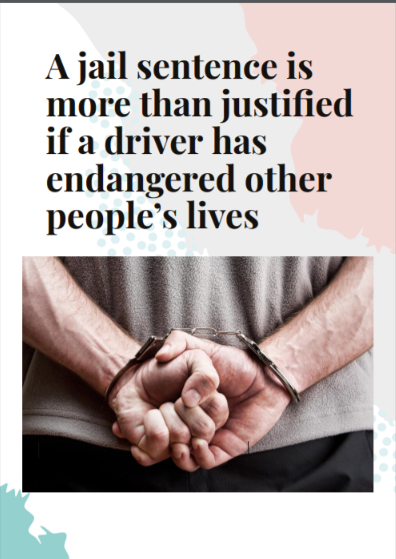Yay! It’s March! One of my fav seasons! I’m basically ticking off the days in my calendar until March 31 when we turn the clocks ahead and get more hours of daylight. In case you haven’t figured yet, I’m a sucker for bright sunny days.
This lesson plan about Crime and Punishment has been on my to-make list for a long time. And since I’m also ticking off the days before finals, I have decided to finally write it. “Don’t leave for tomorrow what you can do today” or so they say.

This lesson plan is intended to fill a four-hour lesson or maybe a bit more. My classes are 110 minutes long so my intention is to dedicate two classes to talking about this topic. You can skip some of the tasks – don’t you dare!- if you don’t want to spend four hours talking about crime and punishment.
Day 1
Day One is a bit more boring than Day 2. Be warned!
Step 1: Lead-in.
1. Revising vocabulary. At this level, students know some common vocabulary related to crime and it’s always a good idea to tap into students’ prior knowledge. You want them to feel they are learning, but you probably don’t want them to feel overwhelmed by the amount of vocabulary they have to study.
Write Crime on the board and ask students in pairs to write down as many different crimes as they can think of.
Ask for feedback and write them on the board. It might be a good idea to introduce at this point the names for the criminals and the action verbs for each crime.
Example: they write kidnapping, and they also get kidnapper and to kidnap

2. Speaking: Point to some of the crimes on the board and ask simple questions such as
Do you know anyone who has been burgled/ mugged/kidnapped/ stopped by the police while drunk-driving? What happened?
Step 2: Introducing New Vocabulary.
1. A Game with FlipCards. As I wrote in another post, Quizlet and I have made up, it’s not that we had fallen out, it’s just that I found other flip card apps more visually appealing. I still think they could update their app but the truth is that now I find myself using Quizlet more and more often. I am planning to use Quizlet in two ways. The one below- Flashcards mode-on Day 1 and Quizlet Live on Day 2 ( I warned you, Day 2 is more fun!)
Procedure: Divide the class into Team A and Team B. They should name a spokesperson for each team. Flip a virtual coin to decide who starts the game. Let’s say Team A starts the game. Display the first definition and ask Team A to guess the crime. Allow a maximum of 10 seconds and ask the spokesperson to tell you the crime. They can continue playing until they make a mistake or cannot come up with the crime matching the definition. At this point, the turn goes to Team B who can try to guess the crime. If they can’t, they will still continue trying to guess crimes until again they make a mistake or cannot provide the crime for the definition on display. Every correct guess scores 1 point. It goes without saying the winner is the team who has scored the most points.
The idea is to facilitate learning, so after the game do the exercise again with the whole class, this time trying to focus only on the pictures and quickly saying the crime. A third time at the end of the class? Why not!
If Quizlet does not work, here you are another version of the Flashcards
Introduce the term “white-collar crimes” also called “corporate crime”. Explain that white-collar crimes are those financially motivated, nonviolent crimes committed by business and government professionals. Ask students to name some white-collar crimes and ask:
Do you think white-collar criminals should do time in jail?
Want to go the extra mile? For a more extensive list, click here
2. Vocabulary related to Crime and Punishment.
We have the crimes and the criminals. Now, what else? To talk about crimes and punishment we need vocabulary. Find the PDF here
3. Confusing words: steal, rob and burgle
This post about the difference between these three verbs published some time ago, comes in handy. Check it out
Step 3: Speaking.
Time: 2 minutes per question
Ask students to work in groups of three. Name them Student A, B and C. Give each of them a scrap of paper and ask them to write 4 words they remember related to crimes. Display the first question from the presentation below and ask student As in the group to answer the question trying to use the words in their scraps of paper. Display the second question and ask student Bs to do the same. Repeat procedure for student Cs.
Ask students to swap scraps of paper within the members of their group and then ask all the student As in the groups to move to another group. Repeat the procedure above.
Note: Ask students to keep their scraps of paper as they will be used on Day 2.
Step 4: Listening and Speaking. Note-taking
Play the following videos. The task for each of them is the same.
- Ask students to take notes and summarize the information
- Ask: Does the punishment fit the crime?
Five teens charged for murder for throwing rocks
Animal abuse
Drunk driving
I know, I know... I said two hours... maybe a bit more :)
Day 2
Day 2 is all about reinforcing vocabulary, playing and speaking. Check it out!
Vocabulary Review
Go to the study set I created for crimes here and click on Live to play this engaging game offered by Quizlet.
See how Quizlet Live works here
Speaking. Using grass skirts. Making up a funny crime story
Preparation:
- Choose a number of crimes and write them down. You can use my own template. See it here.
- Cut a line between words (see picture) but don’t cut them all the way so that the slip of paper doesn’t detach.
- Each poster contains 9 crimes. If you have between 10 and 18 students you will need two copies of the poster.
- Put the poster(s) on the walls of the class.

- Procedure:
- Point to the posters on the walls of the class.
- Tell students they will have about 10 minutes to make up a funny crime story. They can take notes but they cannot write the whole story.
- Ask students to stand up and take a crime. They will do it by tearing off the piece of paper containing the crime.
- Students sit down and began making up their funny crime stories.
- In groups of 3, they share their stories and decide on the best story in the group.
- The best story in each group will be then shared with the whole class and again the best story will be chosen.
Speaking. Posters
Display the four posters on the walls of the class. If you have a lot of students, you can always duplicate the posters and divide the class into two groups assigning a wall of the class to each group.
Remember the scraps of paper with vocabulary on it from Day 1, Step 3? Awesome! Choose some of them and use sellotape to place them next to the poster. There should be one scrap of paper per poster.
Ask students to stand up in groups of three and stand next to a poster. Tell them they will need to talk about the ideas on the posters trying to use the vocabulary displayed next to it. Allow 7-8 minutes per poster and then, ask students to move clockwise to the next one. Repeat procedure.
Posters here

I hope you have liked this longish lesson!

Glad to be of help!!! Good luck!
Hi Cristina , love it! I am studying for the eoi english oposition exam , a bit confused but I was planning to do a writing a crime story for my didactic unit and yours has inspired me a lot! Thanks!
Thanks for letting me know!
Hi Cristina,
I’m an ESL Teacher of 30 years here on a summer camp in England. I love the Crime and Punishment lesson. Saving me so much time…and energy!
Here’s to many more!
Thank you.
Jessica Mann.
I’m glad you found the lesson plan enjoyable. Thank you for your kind words!
Thank you so much for sharing, Cristina. Such an enjoyable lesson plan!
Thanks, Susan!
Thanks, love this lesson.
There’s a small error on the last poster, it should say ‘if’ not ‘f’.
Thanks again
Glad you liked it!
Thanks so much for all the ideas!
Great!!! Glad you like it!!
Really incredible!!Thanks a lot for your work and for sharing it !! I am using part of it in my classes.
Great to know you find it useful!
I onece dealt with this topic but just with petty crime, cause I didn’t want to expose my students to extreme violent words or images.
I really appreciate the way you tacle the topic specially the vid and flashcards. Thanks , I will try again.
Thanks Ann. Honoured!
Hi Cristina,
Just to let you know that we’ve shortlisted this blog post for this month’s TeachingEnglish blog award and I’ll be putting up a post about it on tomorrow’s TeachingEnglish Facebook page http://www.facebook.com/TeachingEnglish.BritishCouncil, if you’d like to check there for comments.
Best,
Ann
Thanks Irene! I am certain they do! 🙂
Oh Cristina¡ you have converted an atrocious, violent and no funny at all topic, into a very pleasant game, which make us enjoy and fix vocabulary at the same time.
Thanks so much for your constant work. I hope all your pupils will appreciate it.
Exactly! This topic is probably not one of the nicest to talk about.
i do not like this topic but watching some videos and practising different kind of exercises it could be more easy for me to learn about crime and punishment
Thanks for your comment Carmen! I do spend a lot of time working, but creating content for you is also a hobby of mine. So, no big deal here!
I never liked the topic crime and punishment, but this video made me reflect about the sentence and read additional information. Thanks a lot.You spend a lot of time working